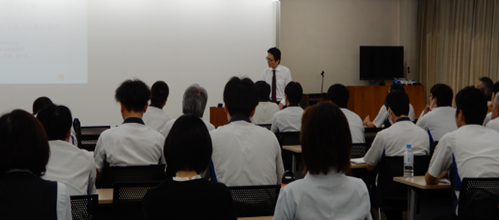Relationships with suppliers and business partners
The material departments of the SHIBAURA MACHINE Group consider environmental preservation, procurement standards,and compliance to be three major elements of CSR procurement.
Green procurement
Committed to "passing the environment of this 'one and only planet’ on to next generations in a healthy condition," the SHIBAURA MACHINE Group promotes the procurement of products, parts, materials, and raw materials which have lesser environmental load, for the purpose of and as an integral part of developing environmentally friendly products ("green procurement").
SHIBAURA MACHINE has formulated Green Procurement Guidelines related to the environment and has defined a Shibaura Machine Group policy and evaluation/judgment standards regarding procurement. The Green Procurement Guidelines were revised in December 2023. The list of environment-related substances was revised and added to. SHIBAURA MACHINE carries out the latest environmentally-friendly procurement activities throughout its supply chain.
Procurement from business partners who are promoting environmental preservation activities
Activities concerning environmental conservation are basically considered to be suppliers’ voluntary activities. Shibaura Machine Group supports their improvement activities as required.
Promoting environmental activities with a new EDI system
We use an EDI (Electronic Data Interchange) system in our purchasing transactions to reduce the need to send and receive slips and documents to or from business partners by telephone, email, facsimile or regular mail, and make the processes paperless to curtail shipping and paper costs.
Procurement of products, components, materials, and raw materials of low environmental load
By classifying procurement items into three categories (procurement items associated with products such as materials, procurement items associated with production activities, and office supplies such as stationeries) based on their characteristics, we promote procurement of products, materials, and raw materials of low environmental load within their life cycles (each stage of raw material procurement, manufacturing, distribution, consumption, disposal, and so on).
Procurement standards
With the understanding of the International Standard of human rights, we conduct our activities according to the “SHIBAURA MACHINE Group Code of Conduct” that defines the basic policies of procurement activities, starting from the respect for the basic human rights. The procedure for the procurement activities is defined in the “Purchasing Management Provision”, which is implemented by the designated procurement division.
*Reference: “Material Procurement Policy of Shibaura Machine Group”
“Policy for Responsible Mineral Procurement”
Compliance
Regarding the compliance, we defined the basis of purchasing activities in the “Purchasing Management Provision” and ensure thorough compliance by the employees of all the group companies through the education process.
Education and auditing
■Conducted internal compliance education (at 5 times in 2024).
■Conducted internal procurement audits (at 9 times in 2024).
■Participated in third-party seminars etc. (occasionally).

We provided guidance to mainly staff members who are engaged in procurement on improvements and measures regarding the Subcontracting Act, which is essential information, to ensure “CSR procurement” based on the rules of the society free from any fraudulent conduct.
Risk management
We implement risk management as part of company-wide risk management.
Client Whistleblowing System
A new "Client Whistleblowing System" section has been added to our website.
Global procurement
By integrating procurement information that is held in the overseas production sites, we developed a “global procurement network”, a mechanism for specifying the most suitable procurement items in terms of delivery, quality, and price. For the East Asian market and South East Asian market, we plan for the cost reduction by establishing a “system for local production for local consumption” and utilizing the “optimum procurement network”.
